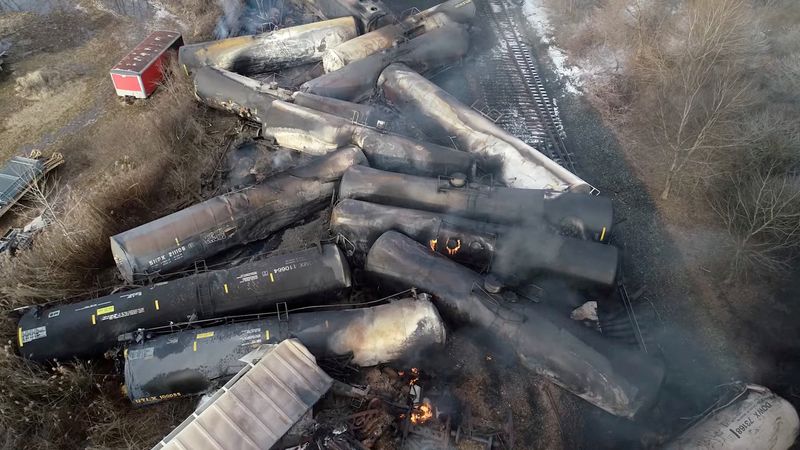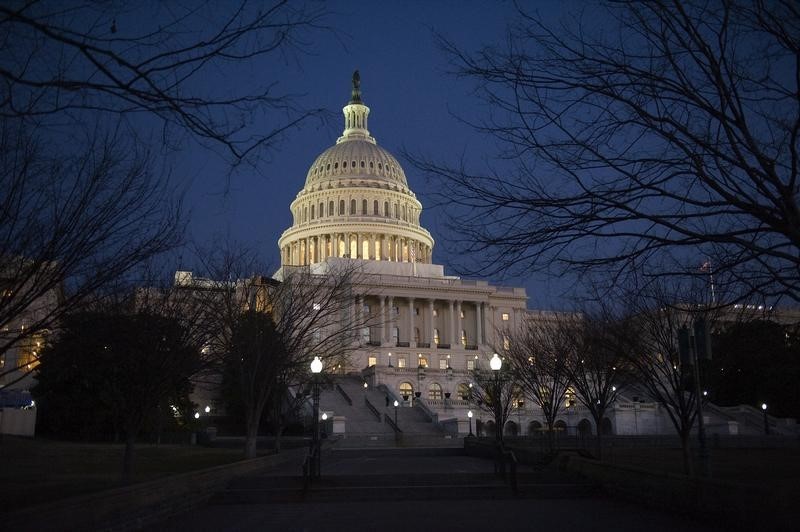By David Shepardson
WASHINGTON (Reuters) -A U.S. Senate panel on Wednesday approved rail safety legislation that tightens rules on trains carrying explosive substances like the Norfolk Southern-operated train that derailed on Feb. 3 in Ohio, catching fire and releasing over a million gallons of hazardous materials and pollutants.
The U.S. Senate Commerce Committee voted 16-11 to advance the sweeping bipartisan legislation, which would mandate the use of technology that can identify equipment failures; prevent cursory railcar inspections; and require stronger safety regulations for trains carrying explosive material like the train that derailed in East Palestine, Ohio.
Commerce Committee chair Maria Cantwell said the legislation "is focused on learning the lessons from East Palestine and helping us to avoid future accidents. No community should have go though the trauma and evacuation and environmental damage that East Palestine had to go through."
It remained unclear if the U.S. House of Representatives will take up of the bill, or if it can get enough Republican support to end debate in the Senate.
The Senate bill would also increase maximum civil penalties from $225,455 to $10 million for serious rail safety violations, and requires two crew members to operate a train.
Norfolk Southern (NYSE:NSC) faces lawsuits from the state of Ohio and the U.S. Justice Department over the train derailment of 38 cars, including 11 carrying hazardous materials.
Norfolk Southern CEO Alan Shaw said in a statement Wednesday the bill "contains important advancements" and said the railroad looks forward to continuing talks with Congress on "achieving a meaningful and effective new law."
Rail safety legislation was introduced in March by Ohio's U.S. senators, Democrat Sherrod Brown and Republican J.D. Vance and has won the backing of all Democrats on the Commerce Committee as well as Republican former President Donald Trump and Republican Senators Mike Braun, Roger Marshall, Mitt Romney and Eric Schmitt.
"We have allowed the rail industry to socialize the risks of their business while privatizing the rewards," Vance said, adding that an entire generation in East Palestine must deal with the aftermath of the derailment for 20 years. "Let's do something here. Let's not rely on vague promises."
The bill would revise existing railroad accident reporting requirements and direct the Transportation Department address any safety concerns with increasingly longer freight trains.
Senator Ted Cruz, top Republican on the Commerce Committee, raised concerns the bill is needlessly prescriptive and would give the U.S. Transportation Department too much authority to write regulations.

In April, Norfolk Southern announced total accrued charges for the derailment of nearly $400 million - a figure that the company said on Tuesday "does not include expected costs for funds relating to property value diminution, long-term healthcare, or water treatment." The railroad committed Tuesday to creating a fund to address the impact on home values for residents near the derailment site.
The Association of American Railroads said it supported some aspects of the bill but raised concerns including provisions "that mandate crew staffing models, expand hazmat transportation operating requirements, micromanage detector networks, and unnecessarily broaden manual inspections."
